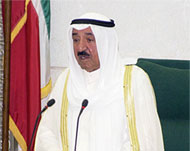Kuwait at odds on spending windfall
With soaring oil prices projected to swell state coffers by $26 billion this year, Kuwaiti authorities face mounting pressure to distribute some of the windfall as cash handouts to the Gulf state’s wealthy population.

Under proposals being pushed by lawmakers, each family in the tiny energy-rich emirate would receive a cash grant of 10,000 dinars ($34,000).
The government has made clear its strong opposition to the plans, which come on top of thousands of dollars in handouts already agreed upon and which are likely to fan resentment in consumer nations over the high cost of fuel.
But legislators, who are up for re-election barely 18 months away, are determined to press ahead with the proposals and are to convene in special session next week.
Two versions of the plan are being canvassed ahead of the 16 November session.
The first, championed by veteran tribal member of Parliament Khalaf al-Enezi, would see each family receive the $34,000 as a grant.
Spending proposals
The second – advocated by another tribal lawmaker, Daifallah Buramia – would see the money handed out to write off bank loans with compensation for families that have not taken out loans.
In defence of his proposal, Buramia said it was better to spend the money on Kuwait’s citizen population of just under a million than to spend it on debt forgiveness for historic foe Iraq as the government is proposing.
 |
|
Sheikh Sabah al-Ahmed al-Sabah |
“Distributing our money to our people is far better than granting it to Iraq and other states who stood against Kuwait” after Saddam Hussein’s 1990 invasion, the MP said.
Each proposal is budgeted to cost the government up to $6 billion, a fraction of the $30 billion surplus accumulated over the past six fiscal years, let alone the record $26 billion windfall that analysts expect the government to achieve this year.
Buramia has secured the backing of at least 28 MPs in the 49-seat parliament, enough to force the special session but short of a majority in the legislature in which the 16 cabinet ministers also have a vote.
Handouts opposed
Prime Minister Sheikh Sabah al-Ahmad al-Sabah, who has demanded sweeping reform of Kuwait’s ultra-generous welfare state, bluntly opposed the idea of the new handouts, saying: “It will never be accepted.”
Al-Sabah’s government has the power to reject the plans even if they secure a majority, but parliament can override the veto with a two-thirds majority.
|
“What is happening in parliament constitutes a threat to national security and the future of Kuwait” Al-Shall Economic Consultants report |
This year, the Kuwaiti government, which has overseas assets estimated at more than $100 billion that do not figure in the state budget and are believed to generate between $3 billion and $6 billion a year, has made a raft of payouts in additional social expenditure.
Under pressure from parliament, the government agreed to pay each citizen a grant of $680 and a monthly salary increase of $170. It also agreed to give each family an allowance of $6800 in free power and water.
The total cost of those payments is estimated at more than $3 billion.
Social security law
The government also bowed to parliamentary pressure this summer to modify the social security law – already one of the most generous in the world – so that an additional $750 million is spent on pensioners.
Some MPs are pressing for a further amendment of the law to exempt pensioners from paying interest on their loans at an estimated cost of $750 million.
 |
|
Kuwaiti MPs will convene a special |
The Gulf emirate provides a cradle-to-grave welfare system to its citizens who pay no taxes and receive most public services either free or at heavily subsidised rates.
More than 90% of the national workforce of 300,000 are employed in government jobs with higher pay and shorter working hours than in the private sector.
Critics say any greater spending on Kuwait’s pampered citizens threatens to call into question the future of a country that depends heavily on a large and disenfranchised expatriate workforce.
“What is happening in parliament constitutes a threat to national security and the future of Kuwait,” said a report from leading analysts Al-Shall Economic Consultants.